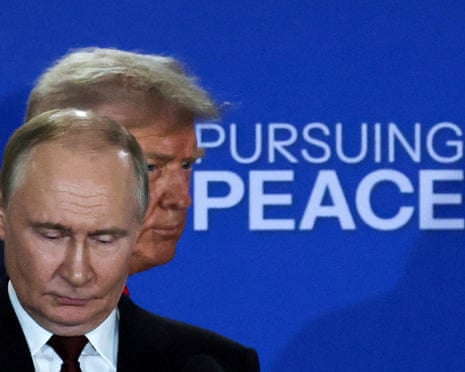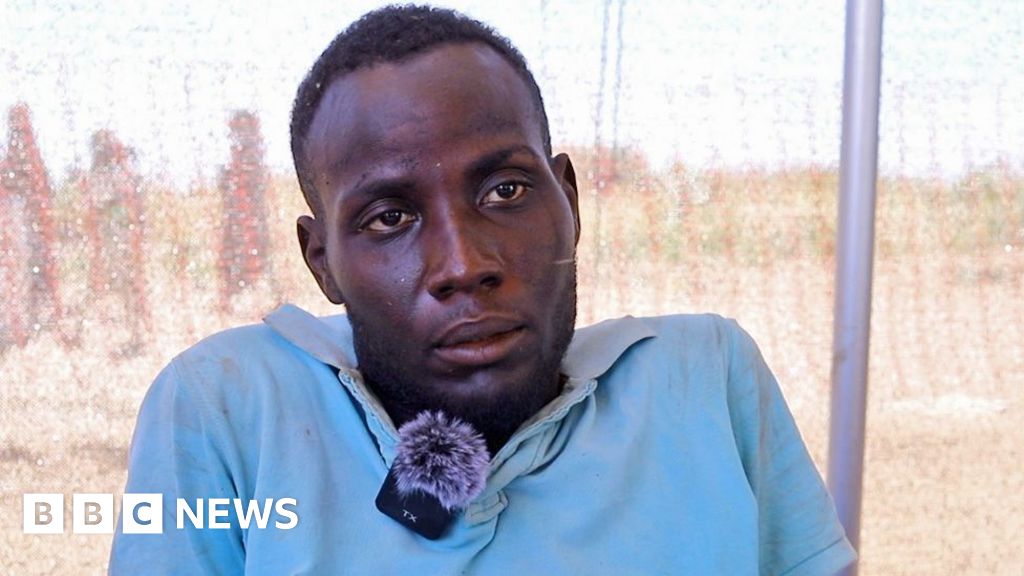Morning opening: Tick-tock

Jakub Krupa
More than two weeks on from the Alaska summit between US president Donald Trump and Russian president Vladimir Putin, the end of the war in Ukraine does not appear to be any closer.
Trump claimed at the time that he was close to a breakthrough that could lead to a bilateral meeting between Putin and Ukraine’s Volodymyr Zelenskyy.
But that does not seem to be any closer either.

Zelenskyy said last week that Ukraine would “remind everyone about it” as Trump’s semi-deadline of “two, maybe three weeks” symbolically expires today.
On Friday, French president Emmanuel Macron warned that if Putin missed the Monday deadline, it would be yet another example of him trying to ‘play’ Trump – something that, Macron said, could not go unanswered and should prompt further sanctions.
But attending a summit in China over the weekend, the Russian president repeated his hardline position, reiterating his opposition to Ukraine’s plans to join Nato and calling for “a fair balance in the security sphere,” which is widely seen as shorthand for his expansive demands on Europe’s security.
“In order for a Ukrainian settlement to be sustainable and long-term, the root causes of the crisis, which I have just mentioned and which I have repeatedly mentioned before, must be eliminated,” Putin said.
Meanwhile, Ukraine said it suspected Russian involvement in the murder of former parliamentary speaker Andriy Parubiy over the weekend.
“We know that this crime was not accidental. There is a Russian involvement. Everyone will be held accountable before the law,” police chief Ivan Vyhivskyi said on Facebook, Reuters reported.
It all suggests another busy week, as leaders try to find new ways forward.
I will bring you all the key updates here.
It’s Monday, 1 September 2025, it’s Jakub Krupa here, and this is Europe Live.
Good morning.
Key events
Europe ‘most affected region globally’ by GPS jamming, commission says
EU transport spokesperson Anna-Kaisa Itkonen also offered a bit more detail on the issue of GPS jamming and its impact on operations.
She said:
“Generally, we have been seeing a quite a lot of such jamming and spoofing activities, notably in the eastern flank of Europe.
Europe is the most concerned region in the or most affected region globally, on this.
There was a letter sent by 13 member states to the Commission in June this year, and they drew our attention additionally to this issue, which is something that is becoming almost daily practice.
It has serious impacts on maritime and aviation and obviously with economic impact as well.”
Von der Leyen’s plane affected by GPS jamming over weekend, commission confirms
European Commission spokesperson Arianna Podestà has now confirmed that von der Leyen’s plane was affected by “GPS jamming,” with the Bulgarian authorities suspecting this was “due to blatant interference from Russia.”
She stressed that the plane landed safely in Bulgaria.
“This incident actually underlines the urgency of the mission that the President is carrying out in the frontline member states.”
Nato-Ukraine council to meet in Brussels today at Ukraine’s request
Ukrainian foreign minister Andrii Sybiha has just said that an extraordinary meeting of the Nato-Ukraine council will be held in Brussels today “at the request of Ukraine and in response to Russia’s recent massive air attacks”.
“We anticipate a focused discussion on joint steps to adequately respond to Russia’s rejection of peace efforts and escalating terror against Ukrainians.
We are grateful to Nato and all allies who continue to show strong support for Ukraine and meaningful peace efforts. Moscow must feel a stronger pressure as the consequence of it prolonging the war.”
Von der Leyen’s plane hit by alleged Russian GPS interference in Bulgaria — report
In the last few minutes, the FT also reported that a suspected Russian interference attack targeted von der Leyen’s plan on approach to Bulgaria over the weekend, forcing the plane to land using paper maps.
The newspaper quoted (£) an official saying that “the whole airport area GPS went dark,” prompting the pilot to circle over the Plovdiv airport for an hour and eventually land using paper maps.
The Guardian has not independently verified the report.
The so-called GPS jamming, which is believed to be caused by Russia, has been a recurring problem affecting parts of eastern Europe, particularly over the Baltic Sea, in the last few years.
In 2024, a similar incident involved an RAF plane taking the then defence secretary Grant Shapps back to UK from Poland, and flying near the Russian exclave of Kaliningrad.
Mobile phones could no longer connect to the internet and the aircraft was forced to use alternative methods to determine its location, the source said.
Turkey working towards fair, lasting peace in Ukraine, Erdoğan tells Putin
Meanwhile, we received a readout from the Turkish president Recep Tayyip Erdoğan’s meeting with Russia’s Vladimir Putin on the sidelines of the Shanghain Cooperation Organisation summit in China.
Erdoğan’s office said that he told Putin that Ankara was working to find a fair and lasting end to the war in Ukraine and that talks between the parties in Istanbul were contributing to peace efforts, Reuters reported.
The pair also talked about bilateral relations, peace efforts between Azerbaijan and Armenia, and the situation in the Middle East.
‘Very dangerous’ situation shows need to strengthen border, defence, Lithuanian president says
Lithuania’s Nausėda also speaks about the country’s plans to use more EU funding to strenghten its border and defence lines after incidents with suspected Russian drones crossing into Lithuania in recent months.
“Lithuania understands the situation now is very dangerous, very fragile, and we have to be able to detect the UAVs [Unmanned Aerial Vehicles] which are crossing from time to time over border, and we should be able to shoot them down if needed.
So this is about safety of our people, and we take this very seriously.”
And that ends their press conference.
EU’s von der Leyen stresses importance of bloc’s eastern border, outlines security guarantees for Ukraine
Appearing alongside Lithuanian president Gitanas Nausėda, the EU’s von der Leyen is now speaking about the EU’s plans for supporting the countries on the bloc’s eastern border.
She says that EU member states with a direct border with Russia and Belarus “will receive additional funding,” as “it is in the European interest that we have the protection of the border here.”
Von der Leyen also speaks about the potential security guarantees for Ukraine.
She says the EU was working on security guarantees together with the Coalition of the Willing, with “a strong, well-equipped and experienced” Ukrainian army set to be the first line of defence, supported by “a multinational group from the Coalition of the Willing with the backstop of the Americans.”
The former German defence minister adds that this will be supported by the EU’s “own defence posture.”
She also says that a potential EU membership for Ukraine would also effectively offer another guarantee.
That appears to confirm what she said in the FT interview.
European capitals working on ‘pretty precise plans’ for deployment to Ukraine as part of security guarantees, EU’s von der Leyen says
European Commission president Ursula von der Leyen is touring the bloc’s seven countries on the eastern border with Russia, talking about preparedness and plans to invest in European defence industry.
She will be in Lithuania and Romania later today, after visiting Latvia, Finland, Estonia, Poland and Bulgaria over the weekend.
But in an interview with the Financial Times newspaper (£) published this morning, she said that European capital were working on “pretty precise plans” for potential military deployment to Ukraine to provide security guarantees, and argued there was a “clear road map” for such deployments.
She said capitals were working on plans for “a multinational troop [deployment] and the backstop of the Americans”.
Let’s see if she goes further in her comments later today.
Zelenskyy to meet European leaders in Paris on Thursday — source
And as if on cue, we are now getting reports that Zelenskyy will meet with European leaders in Paris on Thursday to discuss the next steps and what can be done to raise pressure on Russia, a source told AFP.
“We’re planning such a meeting” between Zelensky and “European leaders”, the source said, adding that Trump “is not so far expected to be there.”
Morning opening: Tick-tock

Jakub Krupa
More than two weeks on from the Alaska summit between US president Donald Trump and Russian president Vladimir Putin, the end of the war in Ukraine does not appear to be any closer.
Trump claimed at the time that he was close to a breakthrough that could lead to a bilateral meeting between Putin and Ukraine’s Volodymyr Zelenskyy.
But that does not seem to be any closer either.
Zelenskyy said last week that Ukraine would “remind everyone about it” as Trump’s semi-deadline of “two, maybe three weeks” symbolically expires today.
On Friday, French president Emmanuel Macron warned that if Putin missed the Monday deadline, it would be yet another example of him trying to ‘play’ Trump – something that, Macron said, could not go unanswered and should prompt further sanctions.
But attending a summit in China over the weekend, the Russian president repeated his hardline position, reiterating his opposition to Ukraine’s plans to join Nato and calling for “a fair balance in the security sphere,” which is widely seen as shorthand for his expansive demands on Europe’s security.
“In order for a Ukrainian settlement to be sustainable and long-term, the root causes of the crisis, which I have just mentioned and which I have repeatedly mentioned before, must be eliminated,” Putin said.
Meanwhile, Ukraine said it suspected Russian involvement in the murder of former parliamentary speaker Andriy Parubiy over the weekend.
“We know that this crime was not accidental. There is a Russian involvement. Everyone will be held accountable before the law,” police chief Ivan Vyhivskyi said on Facebook, Reuters reported.
It all suggests another busy week, as leaders try to find new ways forward.
I will bring you all the key updates here.
It’s Monday, 1 September 2025, it’s Jakub Krupa here, and this is Europe Live.
Good morning.


Comment ×